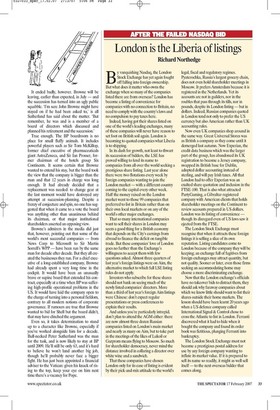London is the Liberia of listings
Richard Northedge By vanquishing Nasdaq, the London Stock Exchange has yet again fought off falling into foreign ownership. But what does it matter who owns the exchange when so many of the companies listed there are from overseas? London has become a listing of convenience for companies with no connection to Britain, no need to comply with the country's laws and no compulsion to pay taxes here.
Indeed, having got their shares listed on one of the world's leading exchanges, many of these companies will never have reason to set foot on British soil again. London is becoming to quoted companies what Liberia is to shipping.
In its dash for growth, not least to thwart its succession of bidders, the LSE has proved willing to lend its name to companies from all over the world seeking a prestigious share listing. Last year alone there were two flotations every week by foreign companies wanting to join the London market — with a different country coming to the capital every other week. Half the money raised on the London market went to those 99 companies that preferred to list in Britain rather than on their own local markets or on any of the world's other major exchanges.
That so many international companies want to sell their shares in London may seem a good thing for a British economy that depends on the City's earnings from abroad to finance the deficit on tangible trade. But these companies' love of London goes no further than the Exchange's willingness to accept them with few questions asked. Almost three quarters of last year's foreign listings were on Aim, the alternative market to which full LSE listing rules do not apply.
Investors who subscribe for these shares should not bank on seeing much of the newly listed companies' directors. More than a third of last year's foreign Aim listings were Chinese: don't expect regular presentations or press conferences to explain their results.
And unless you're particularly intrepid, don't plan to attend the AGM either: there are now almost three dozen Russian companies listed on London's main market and nearly as many on Aim, but to take part in the meetings of the likes of Lukoil or Gazprom means flying to Moscow. So much for shareholder democracy, never mind the distance involved in collaring a director over white wine and a sandwich.
That these companies have chosen London only for its ease of listing is evident by their pick-and-mix attitude to the world's legal, fiscal and regulatory regimes. Pyaterochka, Russia's largest grocery chain, does not even hold shareholder meetings in Moscow. It prefers Amsterdam because it is registered in the Netherlands. Yet its accounts are not in guilders, nor in the roubles that pass through its tills, nor in pounds, despite its London listing — but in dollars. Indeed, Russian companies quoted in London tend not only to prefer the US currency but also American rather than UK accounting rules.
Now even UK companies shop around in the same way. Great Universal Stores was as British a company as they come until it demerged last autumn. Now Experian, the credit data business which was the larger part of the group, has abandoned its UK registration to become a Jersey company, swapped its British base for Dublin, adopted dollar accounting instead of sterling, and will pay Irish taxes. All that London had to offer Experian was an exalted share quotation and inclusion in the FTSE-100. That is also what attracted PartyGaming, a Gibraltar-registered company with American clients that holds shareholder meetings on the Continent to review accounts prepared in US dollars. London was its listing of convenience — though its disregard even of US laws saw it ejected from the FTSE.
The London Stock Exchange must recognise that when it attracts these foreign listings it is selling a slice of its own reputation. Listing candidates come to London because of the company they will be keeping; an exchange full of fugitives from foreign exchanges may attract quantity, but not quality. Sooner or later, even those firms seeking an accommodating home may choose a more discriminating exchange.
Now that the London exchange's officials have no takeover bids to distract them, they should ask why faraway companies about which we know little should want to list their shares outside their home markets. The lesson should have been learnt 20 years ago when a US defence company called International Signal & Control chose to cross the Atlantic to list in London. Ferranti discovered what it had to hide when it bought the company and found its order book was fictitious, plunging Ferranti into bankruptcy.
The London Stock Exchange must not become a prestigious postal address for use by any foreign company wanting to inflate its market value. If it is prepared to sell its name so readily, it might as well sell itself — to the next overseas bidder that comes along.

























































 Previous page
Previous page